Fatty Liver Diet: 12 Foods To Eat And 7 To Avoid
Keep this list of foods to include and avoid handy to boost proper liver functioning.
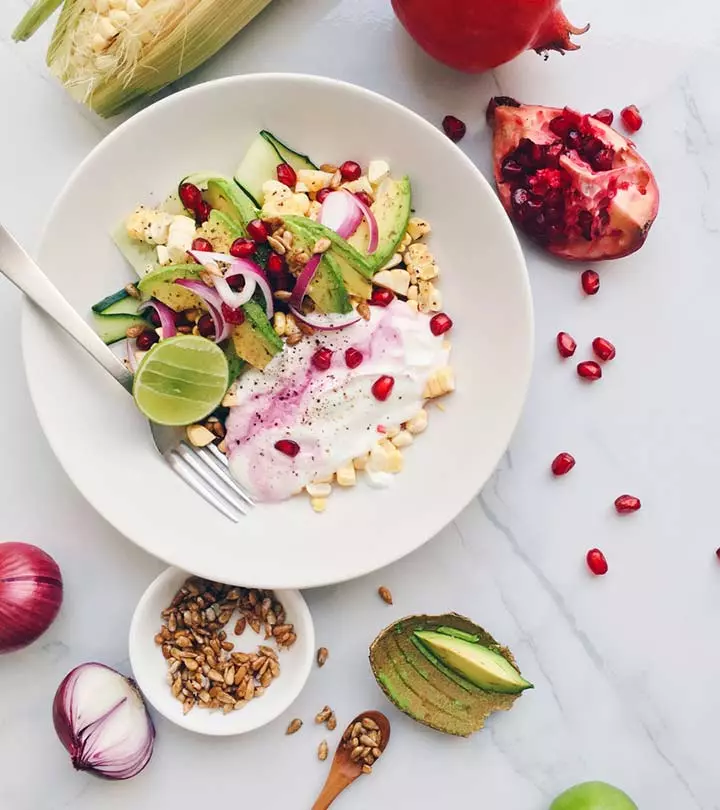
Image: Shutterstock
Fatty liver disease is caused by the deposition of extra fat in the liver. Therefore, a fatty liver diet that includes foods promoting liver health can greatly help. The causes of fatty liver disease are many. These include alcohol abuse, sedentary lifestyle, or genetics (1). The mortality rate from liver disease and cirrhosis has increased by 31% as per the Centre for Disease Control and Prevention (especially between 45 and 64 years of age) (2).
The major symptoms of any liver disease include bloating, sudden weight loss, premature graying of hair, indigestion, and bad breath (3), (4), (5). But in many cases, the symptoms don’t show even if the disease is at an advanced stage. Hence, you should pay attention to your diet and physical activity to protect yourself from liver disease. Eating the right foods can help your liver get better. By choosing certain foods and avoiding others, you can improve your liver health and feel better overall. From the article below, you will learn about the foods best for promoting liver health and the bodily functions that could be affected if one has fatty liver. Scroll down!
 At A Glance: Fatty Liver Diet
At A Glance: Fatty Liver Diet- Principle: A diet of whole foods, fruits, vegetables, and healthy fats and restriction of foods rich in saturated fats, trans fats, and added sugars.
- Purpose: To support and improve liver health in individuals diagnosed with fatty liver disease.
- Who It Is For: Individuals with fatty liver disease or those at risk of developing it.
- Duration: Long-term
- Caution: Some foods may trigger allergic reactions or interfere with medications like warfarin.
In This Article
How Does Fatty Liver Affect The Liver?
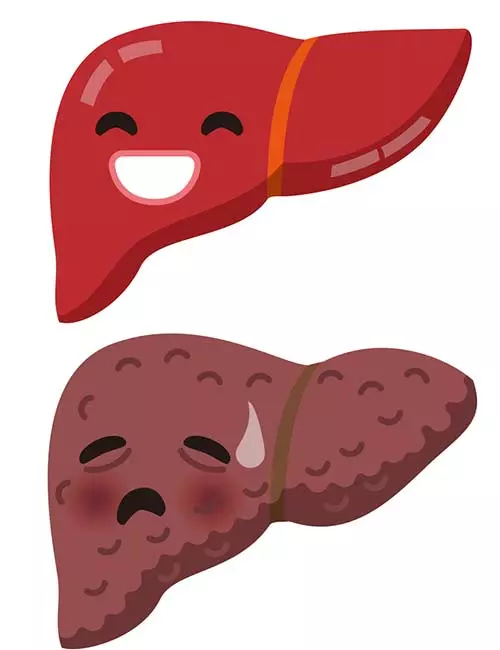
Fatty liver can disrupt the main function of the liver, which is to remove toxins from your body. The liver is the second largest organ, and it filters the blood and metabolizes drugs and other chemicals. However, excess alcohol consumption and medical conditions like diabetes type 2, insulin resistance, genetic disease, and a sedentary lifestyle can prevent the body from metabolizing the glucose properly. In turn, excess glucose can be stored in the liver as fat.

There are two types of fatty liver:
- Alcoholic fatty liver – Due to overconsumption of alcohol
- Non-alcoholic fatty liver – Due to genes, a metabolic disorder, and/or a sedentary lifestyle. This is commonly known as NAFLD (Non-Alcoholic Fatty Liver Disease). NASH or Non-Alcoholic Steatohepatitis is a form of NAFLD that is caused when overaccumulation of fat causes inflammation, leading to liver damage if not treated on time.
 Trivia
TriviaThose with alcoholic fatty liver disease should avoid or limit alcohol consumption and switch to a healthy, balanced diet for fatty liver.
A survey conducted on 4,024 individuals aged 20 and above found that 56.7% had non-alcoholic fatty liver disease. It was further noted that 42.8% had obesity, 26.6% had metabolic syndrome, 35.8% had pre-diabetes or type 2 diabetes, and 35.9% reported inadequate physical activity.
If you do not make an immediate change to your diet and start being active, your liver may develop cirrhosis, cancer, or liver disease. Here is a list of foods to eat and avoid to improve the condition of your liver. Take a look.
Key Takeaways
- A sedentary lifestyle and alcohol abuse can cause fatty liver.
- Bloating, weight loss, bad breath, and indigestion are a few symptoms of fatty liver.
- Tofu, olive oil, seeds, nuts, and broccoli help treat fatty liver.
- Avoid drinking alcohol and eating red meat and food with high sugar to help prevent fatty liver.
12 Foods To Consume To Treat Fatty Liver
1. Fish
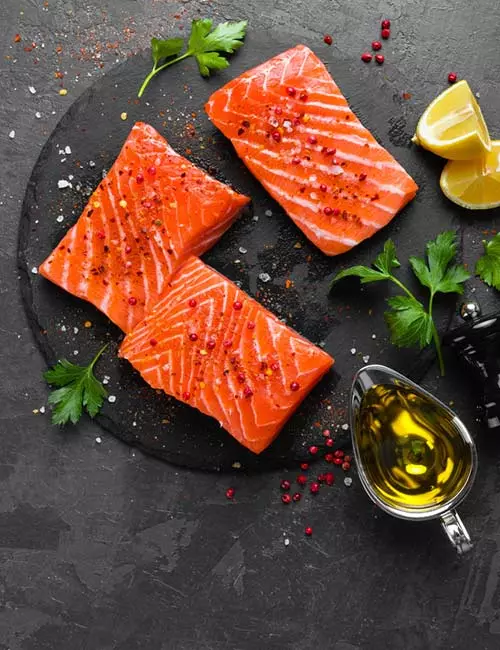
Fatty fish are loaded with omega-3 fatty acids that help reduce inflammation and induce weight loss by restoring the ratio of omega-3 to omega-6 to normal levels. Scientists have proved that consuming fish rich in omega-3 fatty acidsi A family of healthy fats important to lower risks of heart disease, anxiety and improve eye and brain health. can help reduce the fat in the liver. It is a great way to treat NAFLD and NASH (6).
Consume wild-caught salmon, mackerel, silver carp, and hilsa to lose weight and excess fat in the liver and, in turn, help reduce stress in the body.
2. Olive Oil
Olive oil improves the blood lipid profilei Measures the level of cholesterol and other fats in the body to help predict the risk of heart diseases and stroke. , boosts glucose metabolism, and increases glucose sensitivity. Olive oil is a great source of monounsaturated fatty acids that help patients with NAFLD improve their condition (7).
Consume 4-5 tablespoons of olive oil per day. Use it to make “slim” salad dressings, roast, bake, and make stir-fried veggies.
3. Avocado
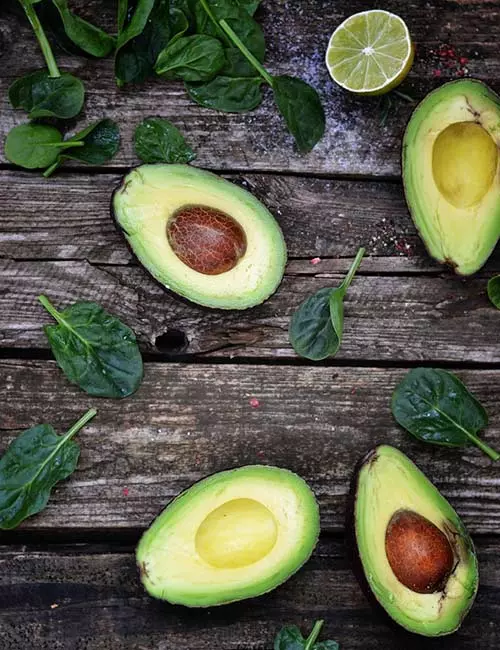
This buttery and mild-flavored fruit is loaded with monounsaturated fatty acids (MUFAs). MUFAs help reduce liver inflammation and inflammation-induced weight gain, decrease bad cholesterol (LDL) levels and triglycerides in the blood, and increase good cholesterol (HDL cholesterol) (8). Hence, avocados are great for weight loss (9). And when you lose weight overall, the fat on the liver also reduces.
4. Walnut
Scientific research has proven that walnuts are great sources of antioxidants and healthy fats. They help decrease hepatic triglyceridesi Fatty acids or triglycerides are metabolized in the liver, the accumulation of which causes non-alcoholic fatty liver disease. , reduce inflammation, and increase insulin sensitivity (10). In another study by French scientists, walnuts helped reduce hepatic fat accumulation (11).
Consume walnuts on a regular basis by adding them to your breakfast smoothies or oatmeal bowl.
5. Tofu
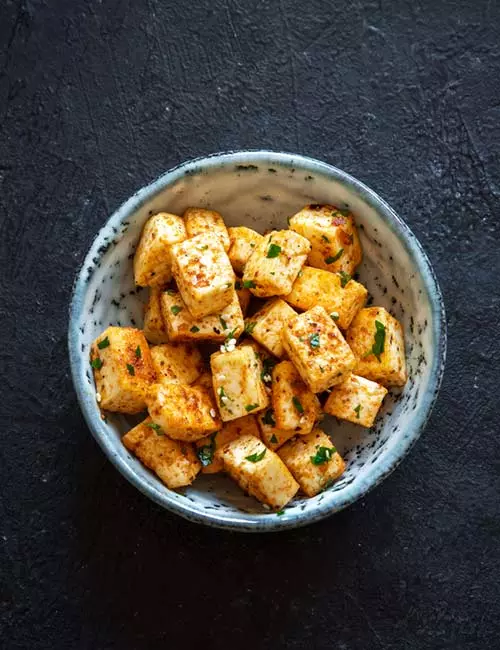
Tofu is a good source of protein and antioxidants. Scientists evaluated its hepatoprotective properties and found that regular consumption of tofu decreased bad cholesterol levels, reduced weight, and increased total protein and albumin concentrationsi A protein made by the liver which in low level is a result of kidney or liver disease and high level is a result of dehydration. (12).
Consume tofu for lunch or dinner by grilling it or tossing a few cubes in your salad bowl.
6. Vegetables And Fruits
Following a vegetarian diet for fatty liver and consuming veggies and fruits on a daily basis can help reduce your fat percentage, which will ultimately lead to the reduction of fat in the liver. Consume a variety of colorful veggies and fruits each day so that you can reap the health benefits from the different kinds of nutrients found in each food.
Also, make sure you consume four servings of five different veggies and three servings of three different fruits every day. In a short period of time, you can lose some weight, and your liver can also start recovering (13).
Nikki Harrison, a beauty, fashion, and lifestyle vlogger, talks about the steps she took to reverse her fatty liver in one of her videos. Her top recommendation was to eat lots of fruit and veggies, spread between three meals a day with very light snacking to keep her weight in check. “One of the biggest things, in my case, that helped were the greens [vegetables] and my exercises that I had to do for my neuropathy (i),” she states.
7. Green Tea

Green tea is one of the best beverages for weight loss. This refreshing tea is a storehouse of antioxidants that help reduce hepatic inflammation, induce reduction of fat in the liver, and decrease the levels of liver enzymes present in patients with NAFLD (14), (15).
Consume 3-4 cups of green tea per day to help get rid of the excess fat.
8. Garlic
Garlic is a superfood. The compound allicin in garlic is a potent antioxidant and can protect you from various diseases, including alcoholic and non-alcoholic fatty liver. It works by reducing inflammation, flushing out toxins, and reducing fat mass in the body (16), (17).
It is best to consume one clove of raw garlic in the morning. Or, if you prefer, you can add garlic to soups, salad dressings, and stir-fries.
9. Sunflower Seeds
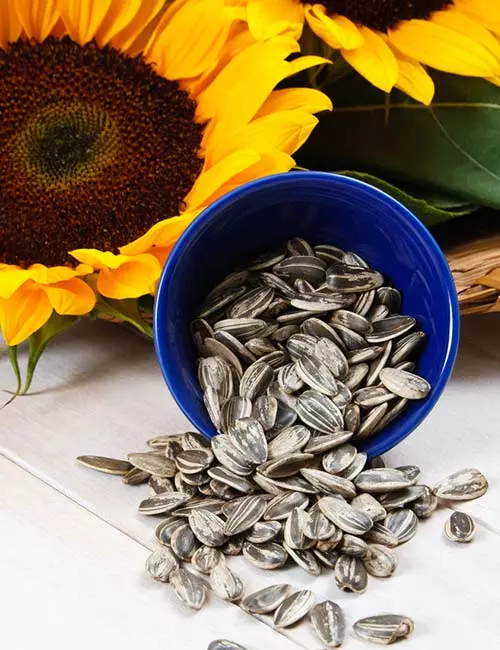
Sunflower seeds are loaded with MUFAs or monounsaturated fatty acids. Also, they are great sources of dietary fiber and copper. Research shows that consuming sunflower seeds could help reduce oxidative stressi An imbalance between free oxygen radicals and the body’s ability to remove them, causing inflammation and long-term illnesses. and treat NAFLD (18).
Add sunflower seeds to smoothies or breakfast bowls or consume a handful of them before or after working out.
10. Oats
Oatmeal is a popular weight loss food as it is a great source of dietary fiber and omega-3 fatty acids. Consuming oatmeal regularly can help you lose the excess fat, in turn, helping to revert NAFLD (19).
Prepare oatmeal with milk and add honey or a pinch of salt (yes, it tastes good) instead of sugar. Add some berries and nuts to keep you full for a long duration and energize you. You can also prepare vegetable oats with carrot, broccoli, and mushrooms and have it for lunch or dinner.
11. Broccoli
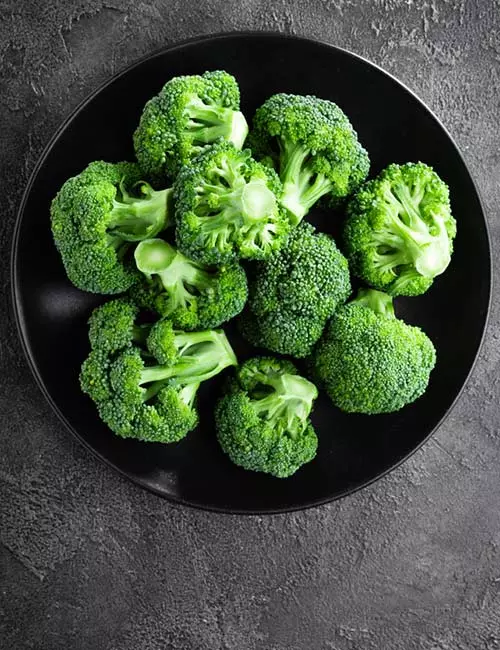
Broccoli is an antioxidant-rich cruciferous vegetable that is “loved” by all (wink). Jokes aside, consuming broccoli on a regular basis can help reduce body fat and flush out toxins. Scientists found that broccoli helped lower hepatic triglyceridesi Type of fat found in the blood that occurs when the body converts calories that it does not require immediately into waxy fats. and hepatic macrophagesi White blood cells that help in the repair mechanism during a progressing liver disease by removing pathogens and dead cells. , thereby protecting liver health (20).
Consume a small cup of blanched or grilled broccoli for lunch or dinner to help prevent further deterioration of fatty liver.
12. Beets
Beets aid in treating fatty liver with their unique nutritional composition. They are rich in antioxidants like betaine and betalains, which can reduce oxidative stress and inflammation in the liver, two major factors that contribute to fatty liver progression (21). The betaine in beetroots promotes bile flow, aiding digestion and the removal of excess fat from the liver (22). Also, the nitrates in beets help relax blood vessels, thus improving blood flow to the liver (23). Including beets in a balanced diet may help reduce fat buildup, promoting overall liver health.
You may consume beets raw, juiced, or lightly steamed. Mix 1/2 to 1 cup of cooked or raw beets with other liver-friendly vegetables, like carrots and leafy greens, to prepare salads and smoothies for addressing fatty liver.
However, remember that this list isn’t exhaustive and there are more foods for a healthy liver you may consider eating. Including these foods in your diet can help your liver work better and reduce fat buildup. However, it is important to talk to a doctor about a diet plan that is right for you.
You must also be aware of the foods you should avoid to prevent a fatty liver. Here’s the list of foods you should not consume for optimal liver health.
7 Foods To Avoid To Treat Fatty Liver
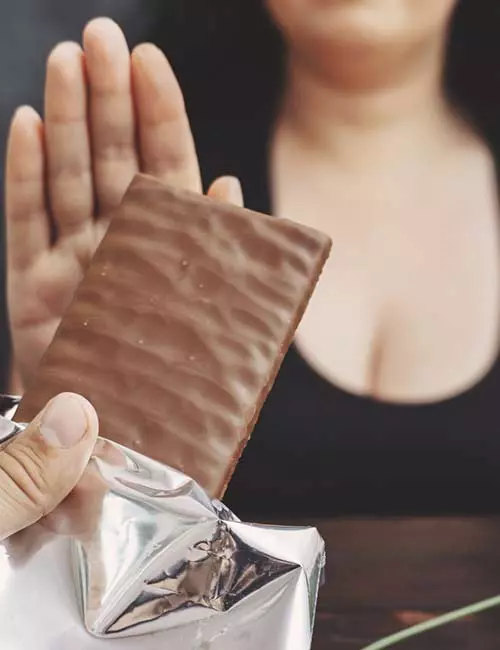
1. Alcohol
Overconsumption of alcohol leads to hepatic steatosisi An increased buildup of fat in the liver. It is also known as fatty liver disease. , which may cause liver cirrhosis and cancer. The first thing that you must do is limit your alcohol consumption. If you have been diagnosed with fatty liver, you must abandon your alcohol habits immediately and stay alcohol-free for at least three weeks.
 Did You Know?
Did You Know?2. Sugar
Sugar can be very addictive and, in turn, can contribute to weight gain and insulin resistance. Also, when you don’t change your diet, it can lead to NAFLD. Therefore, it is best to limit or avoid the consumption of refined sugar or follow a sugar-free diet for fatty liver. Instead, use a natural sweetener like honey since it contains trace amounts of antioxidants and raises blood sugar levels less quickly than sugar.
3. White Bread
White bread is a high glycemic index food, and is digested quickly. That’s why it is so easy to overconsume white bread without even realizing it. The end result? Fat accumulation in various parts of the body. If not kept in check, it can lead to fatty liver. Consume whole grain, homemade bread instead of store-bought, white bread.
4. Red Meat
Consuming excessive amounts of red meat can put your cardiovascular health at risk because it is high in saturated fat and can lead to high triglyceride and high cholesterol levels.
5. Trans Fats
Trans fats are present in many fried foods, biscuits, and crackers. Overconsumption of these foods can lead to obesity, diabetes, and NAFLD.
6. Soda
Soda is loaded with sugar. The more sugar you consume, the more you are at the risk of being obese and developing fatty liver. Therefore, stop consuming soda (including diet soda) and drink healthier, lower sugar beverages like coconut water, water, green tea, lemon-infused water, or black coffee instead.
7. Salt
Excess salt can cause water retention in the body that can hinder glucose metabolism, leading to obesity, diabetes, and fatty liver. Therefore, use minimum amounts of salt in your food to protect your liver.
In addition to avoiding eating these foods, controlling how much you eat is important. Even healthy foods can cause you to gain weight if you overeat. This can make fatty liver problems worse.
It’s easy to see that eating healthy is the ONLY way to prevent fatty liver and protect your liver from further deterioration. If you are struggling to follow a healthy eating schedule, here’s a sample anti-inflammatory diet for fatty liver for you.
Sample Fatty Liver Diet Plan
| Meal | What To Consume |
|---|---|
| Early Morning (6:00 -7:00 a.m.) | 1 cup warm water with juice of half a lime + 1 clove of garlic |
| Breakfast (6:45 – 7:45 a.m.) | ½ avocado on one slice of whole grain bread toast + 1 cup black coffee/green tea |
| Mid-Morning (10:30 a.m.) | 1 banana |
| Lunch (12:30 – 1:00 p.m.) | Grilled tofu salad + 1 cup coconut water |
| Snack (3:00 p.m.) | 1 cup green tea + 1/2 cup boiled Bengal gram |
| Dinner (6:30 p.m.) | Poached salmon and grilled veggies |
This diet will give you the following benefits.
Benefits Of Fatty Liver Diet
- Helps you lose weight.
- Protects you from diabetes.
- Lowers LDL cholesterol.
- Keeps you energized and active all day long.
- Improves liver function.
Does The Fatty Liver Diet Work? What Staci Gulbin, RDN, Says
, MS, MEd, RDN, says, “Contrary to what some may believe, those with fatty liver can benefit from consuming certain fats in the diet as long as they are healthy fats that can help reduce inflammation, like those from fatty fish and plant-based fats. I recommend that those with fatty liver consume healthy fats from fatty fish and plant-based fats to help reduce inflammation.”
Apart from diet, lifestyle modifications are key to improving liver health and sometimes, reversing fatty liver diseases. Keep reading to learn more.
Lifestyle Modifications For Fatty Liver
Here are some lifestyle modifications that can complement your fatty liver diet:
- Focus on creating a healthy calorie deficit through a balanced diet and regular exercise.
- If you drink alcohol, it is important to do so in moderation or avoid it altogether.
- If you smoke, quitting is one of the best things you can do for your overall health.
- Find healthy ways to manage stress, such as practicing relaxation techniques, yoga, or meditation.
- Aim for 7-8 hours of quality sleep each night.
Remember, it is crucial to consult with a healthcare professional before making any significant changes to your diet or exercise routine. They can provide personalized guidance, monitor your progress, and reassure you on your journey to better liver health.
Infographic: Key Foods To Eat And Avoid For A Fatty Liver
A sedentary lifestyle and excessive alcohol consumption can lead to fatty liver disease. This condition can cause bloating, bad breath, and indigestion. If you are looking to change your diet to improve your liver health, check out the infographic below for the top food choices that can protect your liver and those you need to avoid.

Illustration: StyleCraze Design Team
The fatty liver diet consists of foods that are rich in antioxidants, omega-3 fatty acids, and monounsaturated fatty acids. The foods listed above help reduce bad cholesterol and triglyceride levels in the blood besides reducing fat in the liver and inflammation. They also help reduce overall fat mass and lead to effective weight loss. While you are on the fatty liver diet, make sure you avoid consuming trans fats, white bread, red meat, soda, sugar, and alcohol to prevent fat accumulation in the liver. To be on the safe side, consult a doctor before going on this diet.
Frequently Asked Questions
Are eggs okay for fatty liver?
Studies suggest that egg consumption might increase the risks of fatty liver disease (22).
Is yogurt good for fatty liver?
Yes, yogurt being a natural source of probiotics, may help reduce the fat content and be beneficial for fatty liver.
Are apples good for fatty liver?
Yes, apples being a rich source of dietary fiber can prove beneficial for people with fatty liver disease.
Illustration: Fatty Liver Diet Plan And Foods To Eat And Avoid
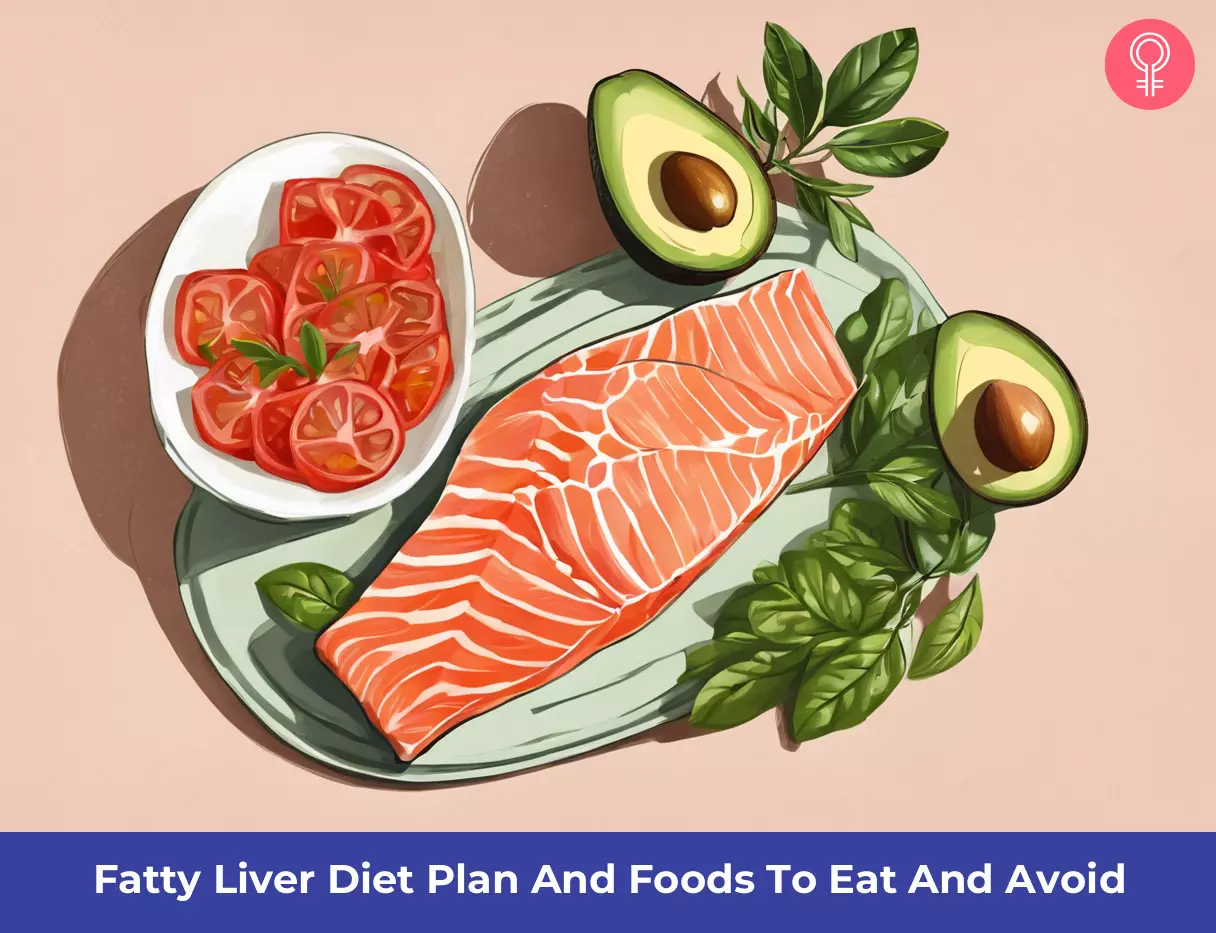
Image: Stable Diffusion/StyleCraze Design Team
Learn about the best diet for fatty liver disease. Check out the video below to get the latest tips and advice on how to manage the condition through your diet and stay healthy.
Personal Experience: Source
StyleCraze's articles are interwoven with authentic personal narratives that provide depth and resonance to our content. Below are the sources of the personal accounts referenced in this article.
i. How I Reversed My Fatty Liver In 6 Months! *Tips And Advice*https://www.youtube.com/watch?v=qRlnjwMt21U
References
Articles on StyleCraze are backed by verified information from peer-reviewed and academic research papers, reputed organizations, research institutions, and medical associations to ensure accuracy and relevance. Read our editorial policy to learn more.
- “Occupational lifestyle diseases: An emerging issue” US National Library of Medicine2.“QuickStats: Death Rates* for Chronic Liver Disease and Cirrhosis,† by Sex and Age Group — National Vital Statistics System, United States, 2000 and 2015” Centers for Disease Control and Prevention3.“How bad breath could be a sign of liver disease and mouth ulcers could indicate cancer: Leading dentist reveals what your mouth says about your health” Daily Mail Online
4.“Epidemiological and Investigative Study of Premature Graying of Hair in Higher Secondary and Pre-University School Children.” US National Library of Medicine
5.“Gastrointestinal dysfunction in liver cirrhosis.” US National Library of Medicine
6.“Effects of Omega-3 Fatty Acid in Nonalcoholic Fatty Liver Disease: A Meta-Analysis.”US National Library of Medicine
7.“Olive oil consumption and non-alcoholic fatty liver disease.”US National Library of Medicine
8.“Dietary recommendations for patients with nonalcoholic fatty liver disease.” US National Library of Medicine
9.“Hass Avocado Composition and Potential Health Effects.”US National Library of Medicine
10.“Dietary walnut reduces hepatic triglyceride content in high fat-fed mice via modulation of hepatic fatty acid metabolism and adipose tissue inflammation.”US National Library of Medicine
11.“Dietary walnut oil modulates liver steatosis in the obese Zucker rat.” US National Library of Medicine
12.“Antioxidant and Hepatoprotective Properties of Tofu (Curdle Soymilk) against Acetaminophen-Induced Liver Damage in Rats.”US National Library of Medicine
13.“Health Benefits of Fruits and Vegetables.”US National Library of Medicine
14.“Therapeutic benefits of green tea extract on various parameters in non-alcoholic fatty liver disease patients.”US National Library of Medicine
15.“The Effect of Green Tea Extract Supplementation on Liver Enzymes in Patients with Nonalcoholic Fatty Liver Disease.” US National Library of Medicine
16.“Diet Supplementation with Allicin Protects against Alcoholic Fatty Liver Disease in Mice by Improving Anti-inflammation and Antioxidative Functions.”US National Library of Medicine
17.“Effect of garlic powder consumption on body composition in patients with nonalcoholic fatty liver disease: A randomized, double-blind, placebo-controlled trial.”US National Library of Medicine
18.“Non-Alcoholic Fatty Liver Disease and Nutritional Implications: Special Focus on Copper” US National Library of Medicine
19.“Increasing Whole Grain Intake as Part of Prevention and Treatment of Nonalcoholic Fatty Liver Disease” US National Library of Medicine
20.“Dietary Broccoli Lessens Development of Fatty Liver and Liver Cancer in Mice Given Diethylnitrosamine and Fed a Western or Control Diet”US National Library of Medicine
21.“Beetroot as a functional food with huge health benefits: Antioxidant, antitumor, physical function, and chronic metabolomics activity.” Food Science & Nutrition
22.“Betaine supplementation prevents fatty liver induced by a high-fat diet: Effects on one-carbon metabolism.” PubMed
24.“Alcoholic Liver Disease.” US National Library of Medicine
25.“Egg consumption and risk of non-alcoholic fatty liver disease.” US National Library of Medicine
Read full bio of Staci Gulbin
Read full bio of Ravi Teja Tadimalla
Read full bio of Payal Karnik







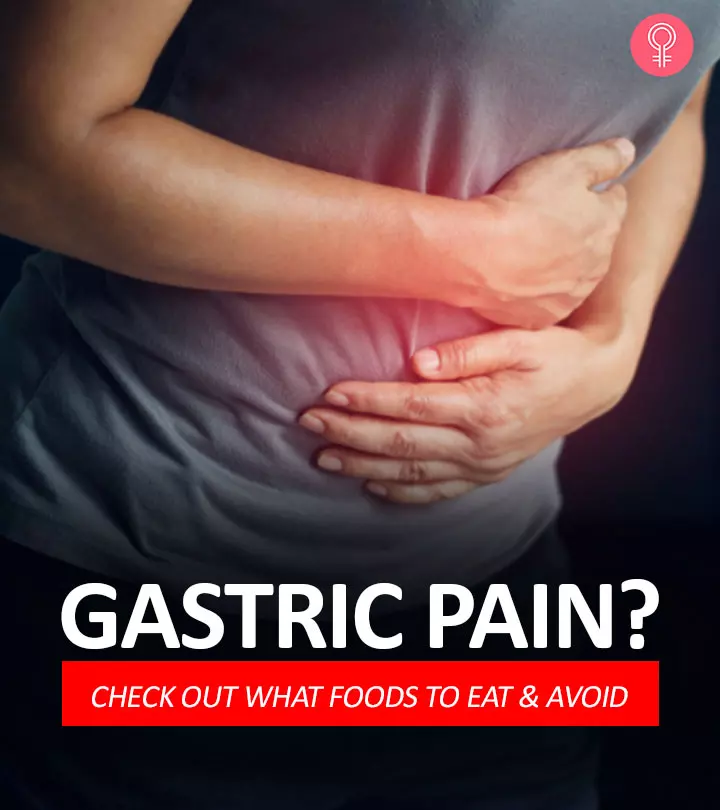

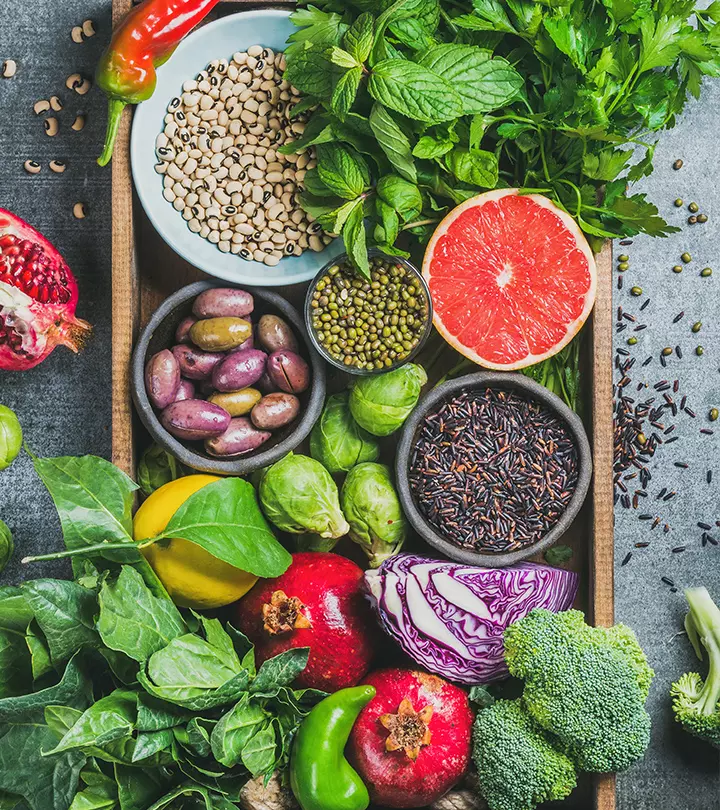


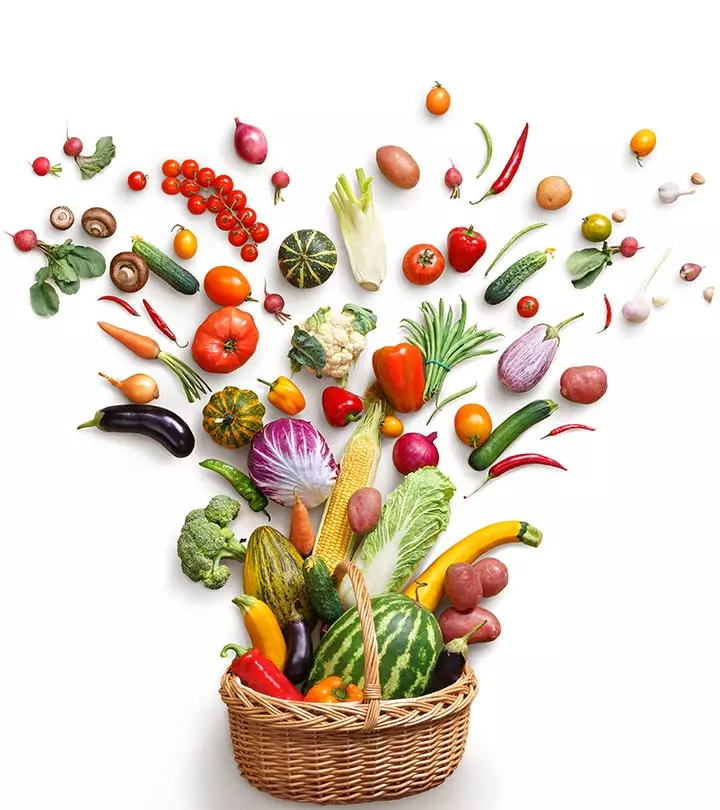






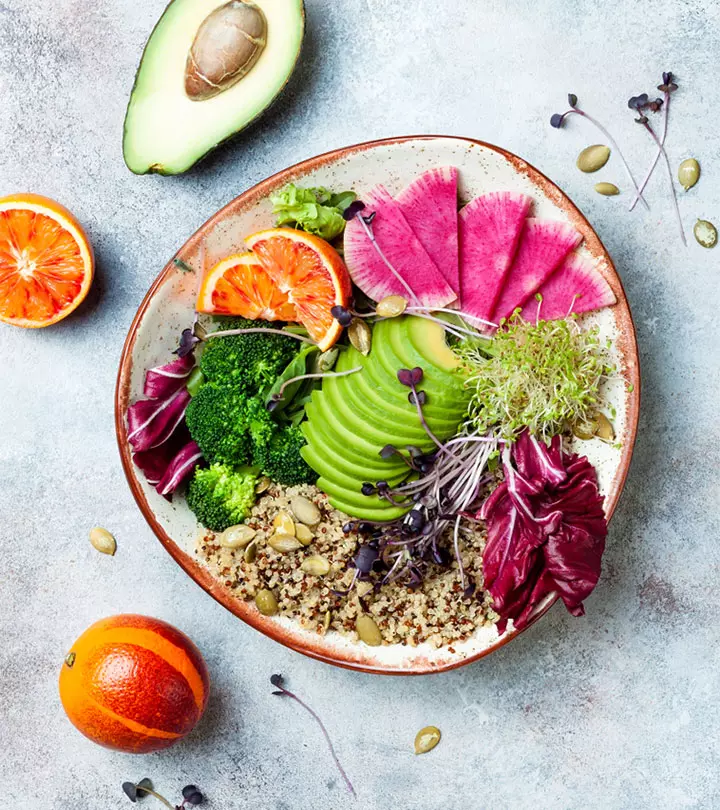
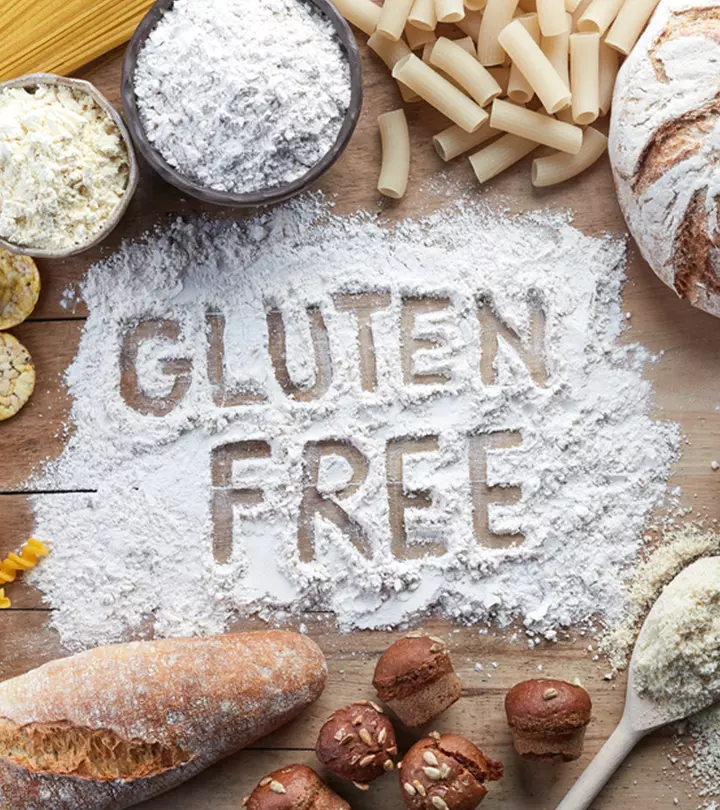
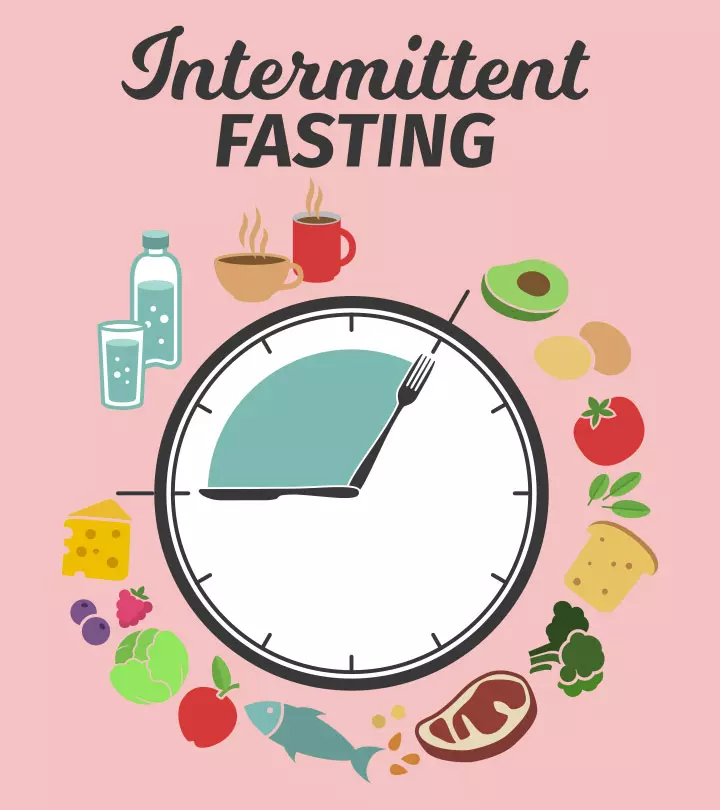


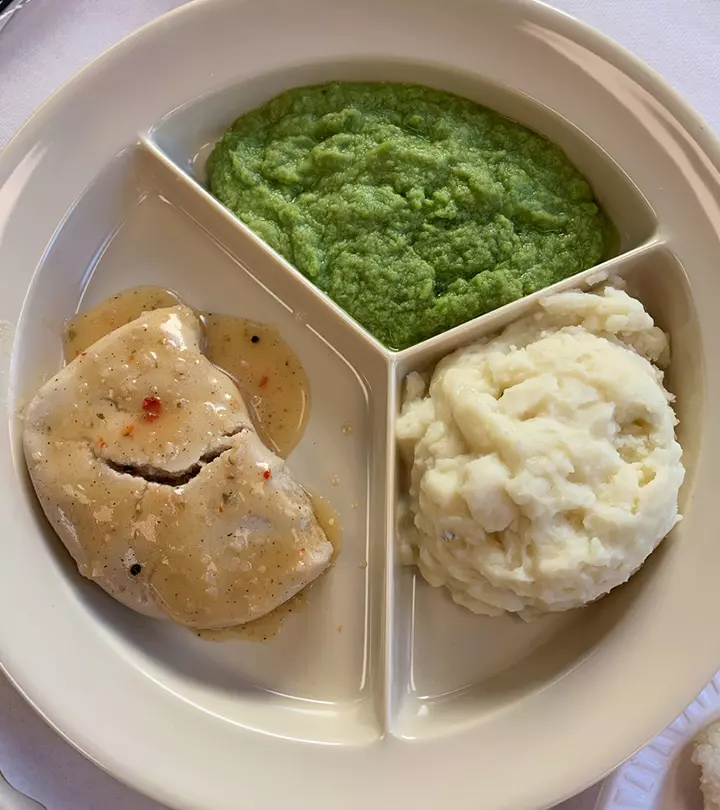
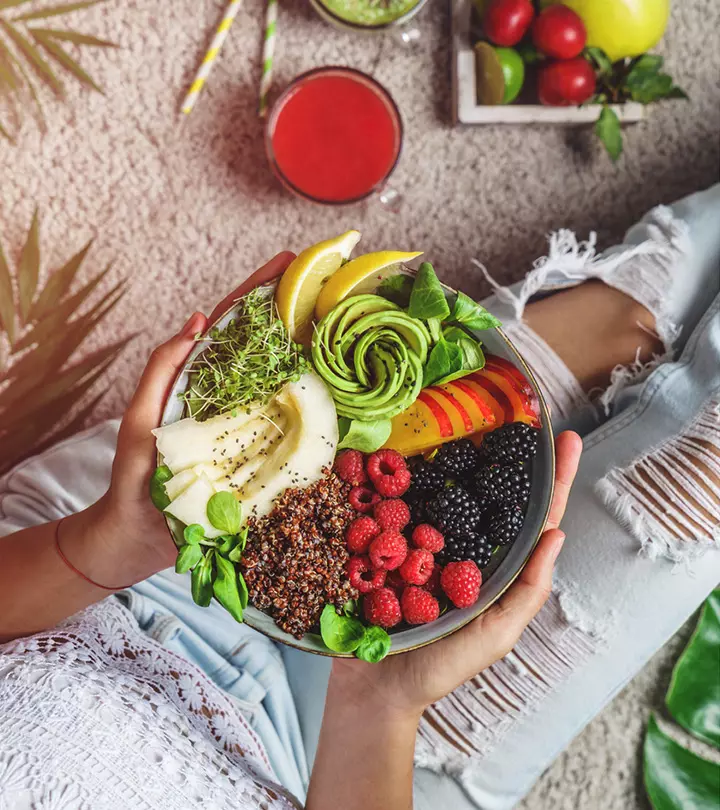
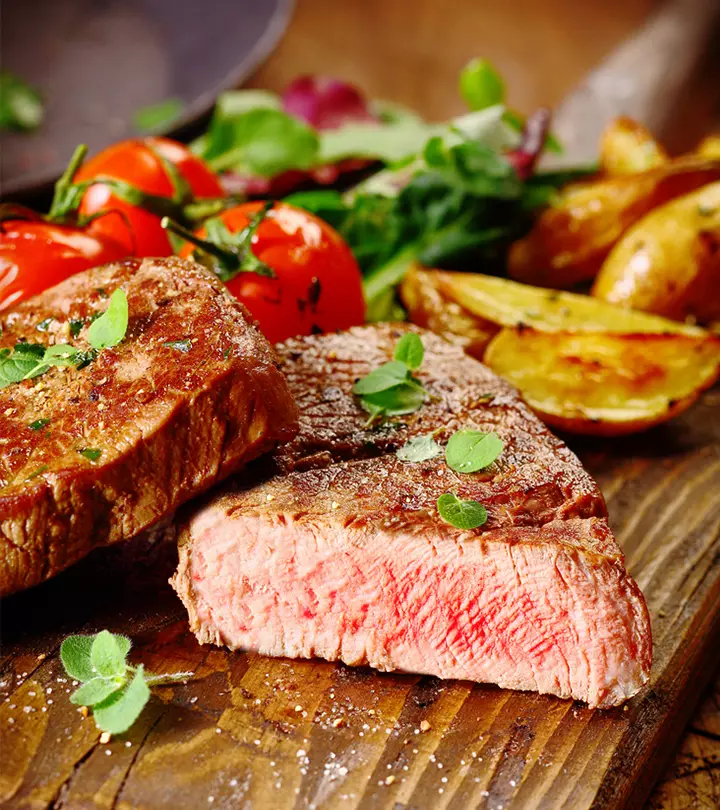
Community Experiences
Join the conversation and become a part of our empowering community! Share your stories, experiences, and insights to connect with other beauty, lifestyle, and health enthusiasts.